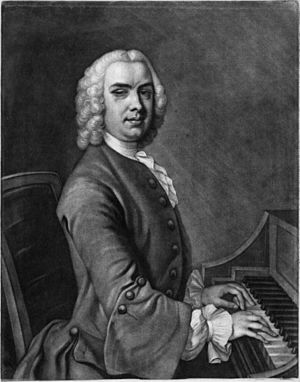John Stanley (composer) facts for kids
Charles John Stanley (born January 17, 1712 – died May 19, 1786) was an amazing English composer and organist. He was known for his incredible musical talent, even though he became almost blind as a young child.
Contents
A Musician's Life
Early Life and Talent
John Stanley was born in London in 1712. When he was about two years old, he had an accident that left him almost blind. But this didn't stop him from loving music! He started learning music at age seven. His teacher was Maurice Greene, a famous composer and organist at St. Paul's Cathedral. John learned very quickly and surprised everyone with his skill.
Becoming an Organist
By age nine, he was already playing the organ. When he was just eleven, he became the official organist at All Hallows, Bread Street church. He earned £20 a year for this job.
When he was fourteen, John was chosen to be the organist at St Andrew Holborn. Many people wanted this job, but he was picked! At seventeen, he became the youngest person ever to get a Bachelor of Music degree from the University of Oxford.
In 1734, he became the organist for the Society of the Inner Temple. He kept this job until he passed away in 1786. At the old Temple Church, his amazing playing on the organ and harpsichord caught the attention of many musicians. Even George Frideric Handel, a very famous composer, often visited the church just to hear John play. Stanley was also a fantastic violinist.
Family and Memory
In 1738, Stanley married Sarah Arlond. Sarah's sister, Ann, lived with them and helped John. Since he was almost blind, Ann became his copyist, writing down his music for him.
Even though he couldn't see well, Stanley had an amazing memory. This helped him lead many of Handel's big musical shows called oratorios. He also loved playing music and card games with his friends. If he needed to play a new oratorio, he would ask his sister-in-law to play it through just once. That was enough for him to remember it all!
He often played the organ at the Vauxhall Gardens, a popular place for entertainment. He was also the first choice to play at charity events and when new church organs were opened. He even found time to teach music.
Continuing Handel's Legacy
After Handel passed away in 1759, Stanley worked with other composers like John Christopher Smith and Thomas Linley. They continued the series of oratorio performances at Covent Garden. For their first season, Stanley wrote an oratorio called Zimri. He played the organ for all the oratorios and performed a concerto during each break.
In 1760, he wrote a special song to remember King George II and to honor George III. It was performed at the Drury Lane Theatre. For the King's wedding in 1762, he wrote another dramatic oratorio called Arcadia.
Handel had been a helper at the Foundling Hospital in London. He even gave the hospital's chapel organ as a gift. Handel also led many performances of his famous Messiah there, raising a lot of money for the hospital. Following in Handel's footsteps, Stanley became a helper at the hospital in 1770. From 1775 to 1777, he led the yearly performance of Handel's Messiah to help the hospital raise funds.
Later Years and Legacy
In 1779, Stanley took over from William Boyce as the Master of the King's Music. This meant he was in charge of the King's musicians. In this role, he wrote many songs for the King's New Year and birthday celebrations. Sadly, most of this music has not survived.
Stanley's last piece was probably a song written for the King's birthday on June 4, 1786. However, Stanley never heard it performed. He passed away at his home on May 19, 1786, at the age of 74.
Stanley's works include an opera called Teraminta, a dramatic cantata called The Choice of Hercules, and twelve other cantatas. He also wrote the oratorios Jephtha, The Fall of Egypt, and Zimri. He is especially known for his instrumental music, like his three books of voluntaries for organ. These voluntaries often start with a short, slow part, followed by a solo section (like the famous "trumpet voluntaries") or a fugue. Some of these have been arranged for string orchestras today.
Musical Works
- Opus 1: Eight Solos for Flute and Continuo (1740)
- Opus 2: Six Concertos for strings (or organ & strings or flute & continuo) (1742/1745)
- Opus 3: Six Cantatas (1742)
- Opus 4: Six Solos for Flute and Continuo (1745)
- Opus 5: Ten Voluntaries for Organ (1748)
- Opus 6: Ten Voluntaries for Organ (1752)
- Opus 7: Ten Voluntaries for Organ (1754)
- Opus 8: Six Cantatas (1748)
- Opus 9: Three Cantatas (1751)
- Jephthah, oratorio (1757)
- Opus 10: Six Concertos for Organ or Harpsichord solo (1775)
- Zimri, oratorio (1760)
- Arcadia, dramatic pastoral oratorio (1762)
- The Fall of Egypt, oratorio (1774)
 | John T. Biggers |
 | Thomas Blackshear |
 | Mark Bradford |
 | Beverly Buchanan |


